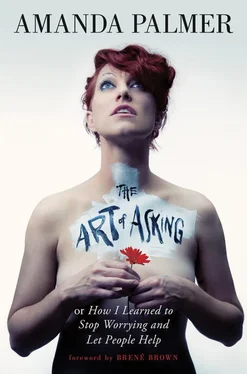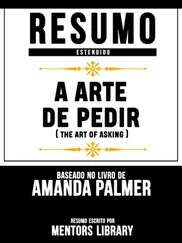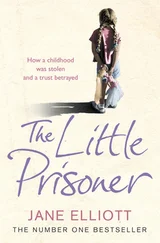The “freedom” of ninja gigs didn’t actually translate to more free time. Adding them last-minute to a tour made my schedule more hectic on paper, but I didn’t really notice that I was taking my off days to play spontaneously any more than you would have seen complaints from a high-security prisoner who was given the option to spend their recreational yard time out at the local bar. I loved waking up and thinking, MAYBE I’LL PLAY IN A PARK TODAY!
Sometimes I’d go to bed thinking I’d do an afternoon ninja gig the next day, then wake up, feel tired, and cancel on myself. Canceling an official show is never an option. Not really. A canceled show wreaks havoc on the schedules and pocketbooks of the ticket-holders, the venues, and the promoters, to say nothing of the work of rescheduling and the black mark on your reputation. It’s almost always easier to take the “show must go on” approach; take the stage sick and barrel through. During the long winter tours of The Dresden Dolls, Brian and I would sometimes get the flu simultaneously and still play the gig, both battling fevers, boxes of tissues beside our instruments transforming into foot-high snot-covered mountains by the end of each night. The crowd would sympathize.
But ninja gigs aren’t at all pre-organized, so they aren’t hard to un-organize.
All the intimacy, none of the commitment. So nice.
I also realized that ninja gigging solved an irritating problem that I’d been battling for years: the dearth of all-ages venues. I’d battled many promoters and agents to ensure that my gigs would be all-ages at all costs, because a good handful of my fans are teenagers. The ninja gigs are always free, always all-ages, and generally never announced more than a day in advance. There is no advertising: only Internet posts and word of mouth. People are encouraged to bring instruments, cameras, children, pets, or whatever else they think of, and there’s no official end time or shape to the event. I usually throw the attention to another musician for a while if I have songwriter friends in town or on tour with me who can show up with an acoustic instrument. It feels a little like an old-school folk hootenanny.
I once paraded a group of two hundred people in Brisbane from a corset shop to a modern art museum and played gigs at either end. I’ve done ninja gigs on the steps of the Sydney Opera House to a crowd of seven hundred in the rain (we paraded to shelter). I played a string of Occupy sites up and down the West Coast when I was on tour there during the height of the movement. I did a silent ninja gig inside Powell’s bookstore in Portland, Oregon, where I wordlessly recommended and signed books of poetry for hundreds of people.
I found out that the people of Byron Bay, Australia, don’t really do Twitter. They don’t even really do the Internet. I morning-twittered an evening ninja gig on the beach, expecting one to two hundred people. Seven people came. I played on the beach and then we all went for ice cream.
I did a ninja gig in Canberra, the Australian capital. All of my fans showed up on bikes, or were loaned bikes, at the headquarters of Rat Patrol, a “freak bike community” of men, women, and children who ride through the city regularly on tall bikes, choppers, and other creatively Frankensteined cycles, wearing flamboyant helmets. We all rode, a pack of a hundred people, to the strains of a battery-powered boom box, passing beers back and forth, through the center of town and to the National Carillon, the five-story bell tower to which someone had a key. I was given a tour of the tower and allowed to play one of my songs on the bells for the crowd gathered down below. A local band played acoustically as thunder roared in the distance. Someone showed up with a surprise upright piano, which they offloaded from their flatbed truck. We wheeled the piano under the bell tower, and I played an all-request concert as the rain pelted us. Everyone was soaked and freezing, we covered the precious piano with jackets, and it was one of the best gigs of my life.
Exactly one year after my TED talk, I arrived in Vancouver for a guest performance at the conference and twittered:
THINKING OF A NINJA GIG AT TED! WHO’S GOT IDEAS?
Three days later, the Vogue Theatre had volunteered their space, and about a dozen TED speakers and performers showed up and shared whatever they felt like. It was like a 1,500-capacity living room. Chris Hadfield, the astronaut and songwriter, played “Space Oddity” on guitar while everybody sang along. A local punk marching band showed up and hung out onstage. The Vancouver food bank, who’d recruited volunteers through my Twitter feed, passed buckets through the crowd and raised almost $10,000.
The most miraculous part of this gig, though, was Sarah Shandl, a girl who raised her hand on Twitter the night I announced the gig, volunteering her services as a last-minute stage manager. I hired her over Twitter, and we spent the next eighteen hours emailing and texting back and forth at least ninety times. She created order in the chaos, helping arrange food and booze, liaising with the food bank, emailing all the performers updated info. She even brought along a friend to manage the guest list of TED people and guest artists for whom we had agreed to save seats. I’d barely met her and she’d saved my ass.
When I took her out to lunch the following day to thank her and get to know her better, I learned that she’d never heard of me, or my music, before the moment she’d volunteered. She’d just seen that someone with a bunch of Twitter followers was throwing a free gig in Vancouver, and thought that that person might need a hand.
• • •
Neil got to know me better. I had a bad habit of wanting to disappear completely for a few full days after freshly separating. When we first got together, I couldn’t stand that he wanted to send back-and-forth texts as soon as we separated. Like, five minutes after saying good-bye at the airport.
He learned to adjust to my Run Away! Run Away! approach every time we parted company, and I was learning to resist emotionally vanishing once we weren’t in the same space together.
I started learning how Neil worked. I figured out how to reassure him that I wasn’t actually leaving him; I was just thrilled to be alone and able to work, to make art, to think, and to email by my lonesome. We pissed each other off, royally, frequently, in those early days. But we were getting better, bit by bit. I stopped thinking he was going to cage me, and he stopped thinking I was trying to flee. The poetry wasn’t lost on us: He had abandonment issues, and I had commitment issues. Go figure.
Also, the sex, which had been fumbling and awkward at the beginning of our relationship, got really hot. We figured that was a promising sign of general relationship progress.
Mostly we realized it was about leaving the doors and windows of the relationship wide-open enough. That way, he could see in, and I could see out.
• • •
I was backstage talking with a friend I knew from the road, the lead singer of a pretty big indie band, after their show at a club in Boston. I’d come to visit, since I was off tour.
Our shows are selling like shit , he said, tossing his sweaty shirt onto the couch and putting on a fresh one.
You sounded great , I said. And the new album is amazing. But you know—it couldn’t hurt if you would actually talk to your fans from stage. They’re there. They’re crowdsurfing. They’re screaming and yelling. But most of the time you acted like the audience wasn’t even in the room. You barely talked to them .
He opened a beer for himself. Easy for you to say. I remember when you stopped in the middle of your set in Seattle and asked them all to text people they knew in Portland for the next night, because it wasn’t sold out. My whole band was backstage, like, in PAIN because it was so awkward. I mean… it’s kind of genius. But we could never do that. You’re such a freak .
Читать дальше












